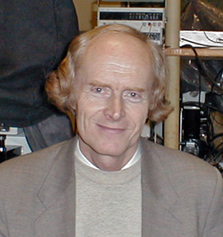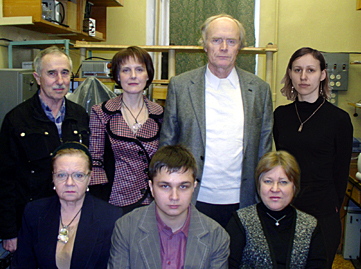| Laboratory of Molecular Basis of Cell Motility |
|
Head of the Laboratory Yurii S. BOROVIKOVProfessor, D.Sc., Ph.D.Phone: +7 (812) 297-37-98
Laboratory was founded in 1995. |

|

|
SCIENTIFIC STAFF
Kirillina V.P. - Senior Scientist, Ph.D.
|
|
The main scientific problems under study Studies are carried out by modern methods of biophysics, biochemistry and molecular biology. Widely used is the method of polarized fluorimetry that has been developed in the Institute of Cytology RAS. The objects of researches are single muscle fibres and models of muscle cells. The basic direction of researches is the study of the molecular mechanisms of force generation produced by actomyosin motor and that of the regulation of actin-myosin interaction during the ATPase cycle. Within this field the principal themes are the following:
Selected Papers
Borovikov Yu.S, Moraczewska J., Khoroshev M.I., Strzelecka-Golaszewska H. (2000) Proteolytic cleavage of actin within the DNase-I-binding loop changes the conformation of F-actin and its sensitivity to myosin binding. Biochim. Biophys. Acta. 1478 (1) :138-51. Borovikov Yu.S., Avrova S.V., Vikhoreva N.N., Vikhorev P.G., Ermakov V.S., Copeland O.,Marston S.B. (2001) C-terminal actin-binding sites of smooth muscle caldesmon switch actin between conformational states. Int. J. Biochem. Cell Biol., 3 : 1151-1159. Borovikov Yu.S, Wrzosek A., Kulikova N., Vikhorev P., Vikhoreva N., Dabrowska R. (2004) Behavior of Caldesmon upon Interaction of Thin Filaments with Myosin Subfragment 1 in ghost fibers. Biochim. Biophys. Acta 1699 : 183-189. Borovikov Yu.S., Dedova I. V., dos Remedios C. G., Vikhoreva N. N., Vikhorev P. G., Avrova S. V., Hazlett T. L., and van der Meer B.W. (2004) Fluorescence depolarization of actin filaments in reconstructed myofibers: The effect of S1 or pPDM-S1 on movements of distinct areas of actin. Biophysical J. 86 : 3020-3029. Borovikov Yu.S., N. Kulikova, O. E. Pronina, S. S. Khaimina, A. Wrzosek, R. Dabrowska. 2006. Caldesmon Freezes the Structure of Actin Filaments during the Actomyosin ATPase Cycle. Biochim. Biophys. Acta 1764 : 1054-1062. Kulikova N., Pronina O. E., Dabrowska R., Borovikov Yu. S. 2006. Caldesmon restricts the movement of both C- and N-termini of tropomyosin on F-actin in ghost fibers during the actomyosin ATPase cycle. Bioch. Biophys. Res. Commun. 345 : 280-286. Kulikova N., Pronina O.E., Dabrowska R., Borovikov Yu.S.. 2007. Caldesmon inhibits the actin-myosin interaction by changing its spatial orientation and mobility during the ATPase activity cycle. Bioch. Biophys. Res. Commun. 357 : 461-466 Pronina O.E., Makuch R., Wrzosek A., Dabrowska R., Borovikov Yu.S. (2007). Caldesmon inhibits both force development and transition of actin monomers from ''OFF'' to ''ON'' conformational state by changing its position in thin filaments. Cell Biology Intern. 31 : 394-404. Borovikov Yu.S., Karpicheva O. E., Avrova S.V., Robinson P., Redwood C. S. (2009). The effect of the dilated cardiomyopathy-causing mutation Glu54Lys of alpha-tropomyosin on actin-myosin interactions during the ATPase cycle. Arch. Biochem. Biophys. 489 : 20-24. Borovikov Yu.S., Karpicheva O.E., Chudakova G.A., Robinson P., Redwood C.S. (2009). Dilated cardiomyopathy mutations in alpha-tropomyosin inhibit its movement during the ATPase cycle. Biochem. Biophys. Res. Commun. 381 : 403-406. Borovikov Yu.S., Karpicheva O.E., Avrova S.V., Redwood C.S. (2009) Modulation of the effects of tropomyosin on actin and myosin conformational changes by troponin and Ca2+. Biochim. Biophys. Acta 1794 : 985-994. Kulikova N., Avrova S.V., Borovikov Yu.S. (2009) Caldesmon inhibits the rotation of smooth actin subdomain-1 and alters its mobility during the ATP hydrolysis cycle. Biochem. Biophys. Res. Commun. 390 : 125-129. Avrova S.V., Shelud'ko N.S., Borovikov Yu.S., Galler S. (2009) Twitchin of mollusc smooth muscles can induce "catch"-like properties in human skeletal muscle: support for the assumption that the "catch" state involves twitchin linkages between myofilaments. J. Comp. Physiol. B. 179 : 945-950. Avrova S.V., Shelud'ko N.S., Borovikov Yu.S. (2010) A new property of twitchin to restrict the "rolling" of mussel tropomyosin and decreases its affinity for actin during the actomyosin ATPase cycle. Biochem. Biophys. Res. Commun. doi:10.1016/j.bbrc.2010.02.128 Borovikov Yu.S., Shelud'ko N.S., Avrova S.V. (2010) Molluscan twitchin can control actin-myosin interaction during ATPase cycle. Arch. Biochem. Biophys. 495 : 22-128. |
Structure Home |